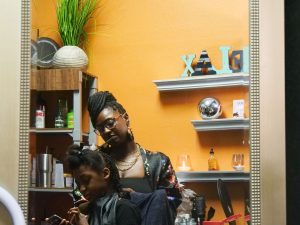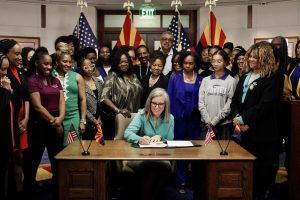- Slug: BC-CNS-CROWN Act. 600 words.
- 2 photos available (thumbnails and captions below).
By Greta Forslund/Cronkite News and Nicole Shinn/Special for Cronkite News
Portions of this story were published May 6, 2022.
PHOENIX – An executive order issued by Arizona Gov. Katie Hobbs Friday prohibits hair-based discrimination against state employees and contractors in the workplace and public schools. The order was inspired by the CROWN Act, which was enacted by Tucson and Tempe in 2021.
“For far too long Black women, men, and children have been deprived of educational and employment opportunities for wearing their natural hair,” Hobbs said in a press release.
In attendance when Hobbs signed the order were Neal Lester, a professor of English at Arizona State University; Beverely Elliott, executive director of the African American Museum of Southern Arizona, Janelle Wood, founder of Black Mothers Forum; and Donna Williams, president of the Phoenix chapter of The National Coalition of 100 Black Women.
The CROWN Act, first introduced and passed in California in 2019, bans discrimination against natural hair textures and styles. It was created by the personal-care company Dove and the Crown Coalition, a national alliance founded by Dove, the National Urban League, Color of Change and the Western Center on Law and Poverty, in partnership with California legislators. CROWN stands for Creating a Respectful and Open World for Natural Hair.
The executive order “demonstrates the need to prioritize the protection of culture and allows individuals to show up as their true selves without being subjected to race-based hair discrimination,” Hobbs said.
Versions of the CROWN Act have been enacted by 20 states. An attempt to pass the CROWN Act on the federal level failed in the Senate in December 2022.
Hobbs’ executive order does not apply to private employers in Arizona, but she encouraged those employers to adopt similar protections.
“I’m hopeful that this inspires legislation to end this kind of inequity across the board,” Hobbs said at the signing.
Locks, Afros, Senegalese twists, braids, fades and cornrows used in naturally textured hair have long been the basis of discrimination against Black people in the workplace and elsewhere. The 2023 CROWN Research Study by Dove found Black women’s hair was 2.5 times more likely to be perceived as unprofessional, and over 20% of Black women aged 25-34 have been sent home from work because of their hair.
In one notorious case in 2019, Andrew Johnson, a young Black wrestler in New Jersey, was told by a white referee to cut the locks he had been wearing since he was a child or forfeit the match. Johnson complied; the image of his shorn hair falling to the floor captured national attention and condemnation.
Hobbs’ order is the latest step in an issue that is personal and relevant to many people’s lives. LeKyndra Ouedrago, a stylist in a Tempe hair salon and owner of a natural hair care brand, started her hair-care journey as a little girl sitting on her back porch, braiding, twisting and styling the hair of family, friends and neighbors just for the fun of it.
Ouedrago has always loved natural hair, and she makes an effort to take others along on her journey, sharing all she has learned. Although some people might discriminate, Ouedrago celebrates hair as part of what makes Black people so beautiful.
“As an African American person, we were born this way,” she said in a 2022 interview. “It is a birthright to be able to wear my natural hair in any facet, in any manner, just like any other race.”
To Ouedrago, the CROWN Act is an affirmation of something she already knew – that natural hair is stunning and expressive.
“All people are beautiful,” she said. “And I believe that on every crown, on every set of hair is an expression. It’s an expression of you emphasizing a part of your beauty.”
For more stories from Cronkite News, visit cronkitenews.azpbs.org.

